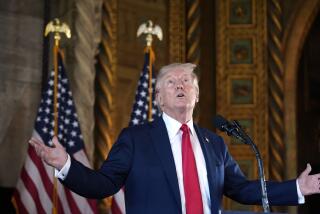COLUMN RIGHT : Brown, on His Unicorn, Rides to the Rescue : Back to the future with Mr. Moonbeam--he can see ahead and knows what’s good for us.
- Share via
“A politician can do anything he wants,” Jerry Brown once told an aide, “so long as he manipulates the right symbols.” In challenging George Bush for the presidency, the former California governor has a new set of symbols for manipulation. He seeks to use the growing hatred of politicians, special interests and moneybag influence peddling to promote the political left.
We’ve come to expect innovation from Brown. Long before actress Debra Winger spent the weekend with then-Gov. Bob Kerrey of Nebraska, Brown accompanied Linda Ronstadt on an African safari. Of course, it wasn’t a real safari, for Brown was “politically correct” when PC wasn’t cool. He even agonized over killing Medflies.
The candidate of “limits” (to everything but government’s appetite), Brown was for “new ideas” before Gary Hart even met Donna Rice. He was the nominee of “the future,” a potent if meaningless concept. He would, he promised, show us that “small is beautiful” in all areas but the state payroll.
When he was elected governor in 1974, Brown refused to move into the glitteringly ugly mansion of the Reagans. Instead, he slept on a mattress on the floor of a bare apartment, used an old Plymouth instead of a limo and wore a plastic watch. It was his Ralph Nader period, and it was great politics. It was also phony. He displayed the symbols of frugality, but went on a state spending spree.
Under Brown, government was expanded in the life of every Californian, except in the one area where it’s justified: His Rose Birdized justice system cost taxpayers plenty, while giving thugs the poor-baby treatment and smirking at victims.
Today, Brown is no longer an outward ascetic, but a handsomely graying statesman in expensive suits and a solid-gold Rolex. And he’s running for President on a platform that denounces big government but calls for Gargantuan government.
Brown says he wants to end money power in politics, while putting the government in charge of our money. He seeks decentralization through centralization. He hates lobbyists but supports a system in which a few words in one law can mean billions.
Advocating a centralized energy policy to cut heating, cooling and production, he wants global regulations to cool the earth. (Just what we need: the United Nations running the weather.) He criticizes Ronald Reagan’s tax-rate cuts and seeks to resurrect a militarized make-work corps from the New Deal days. And he promotes Draconian environmental laws to make us consume less, that is, be poorer.
All of this makes as much sense as his plan to launch a California government satellite in the 1970s. (Not that an orbiting Legislature wouldn’t have its appeal.)
“We must live as part of the web of life,” says Brown, but at the center he puts the tarantula of government. And he is sure how the web should be constructed, for his “greatest strength” is envisioning “what hasn’t been and bringing it about.” He can, that is, see into the future, and know what’s good for us.
A Zen Catholic of inherited money and power, Brown advised blue-collar workers to earn “psychic rewards” rather than money. When he was out of power, he sought “self-awareness” on expensive trips to Japan, India, Russia and Bangladesh, a process he recommended to everyone, presumably including workers who could buy their tickets with psychic earnings.
Can Brown’s third presidential campaign succeed? A recent poll shows him first among the Democratic candidates, and he would be the most interesting opposition to Bush: the vision-less George vs. crystal-power Jerry. But one speed bump on the road to the White House is Brown’s galactic disorganization.
Observers compared his Administration to physics’ Brownian Motion, in which zig-zagging particles move about constantly, achieving nothing. When it comes to the nuts and bolts of office, or at least the bolts, Brown has the attention span of a small boy who has to go to the bathroom.
He even reminds some of Ed Meese. Poor Meese was the black hole of the Reagan governorship and presidency, and many an idea and plan disappeared into his bottomless briefcase. Brown may be smarter, but he doesn’t even have a briefcase. Of course, maybe it would be a hindrance as he vaults to the back of his steed.
People are “looking for a man on a white horse to ride in and tell them what to do,” Brown once told an appointee. But he’d better be careful how he mounts. In President Moonbeam’s case, it would have to be a unicorn.
More to Read
Get the L.A. Times Politics newsletter
Deeply reported insights into legislation, politics and policy from Sacramento, Washington and beyond. In your inbox twice per week.
You may occasionally receive promotional content from the Los Angeles Times.










